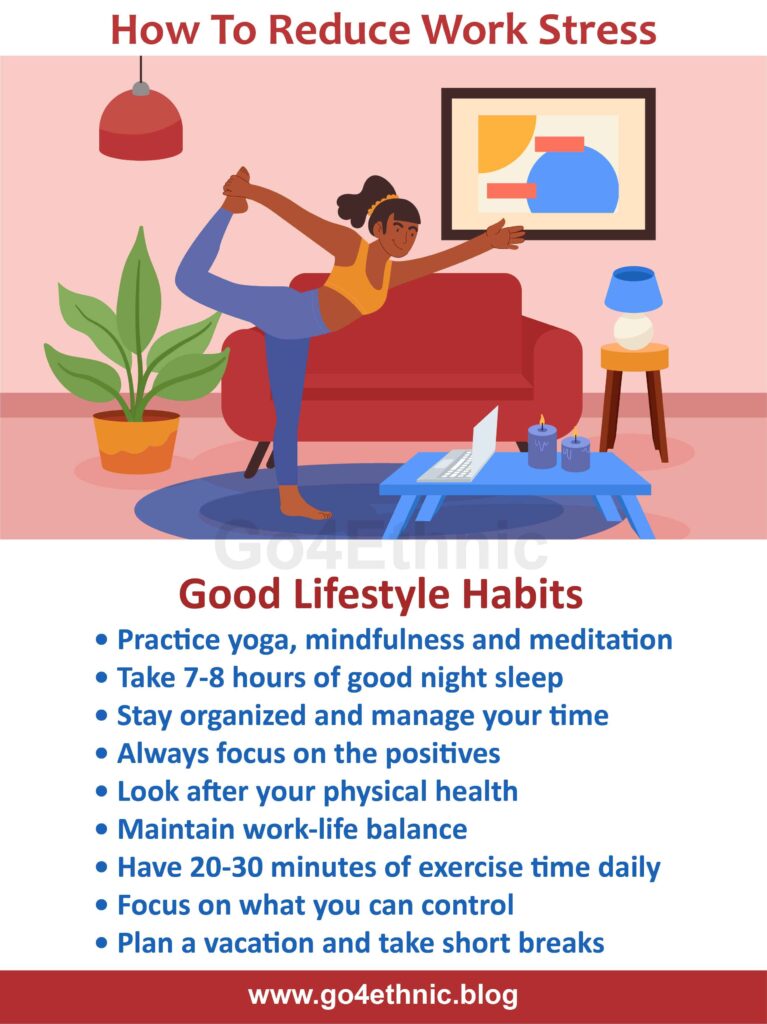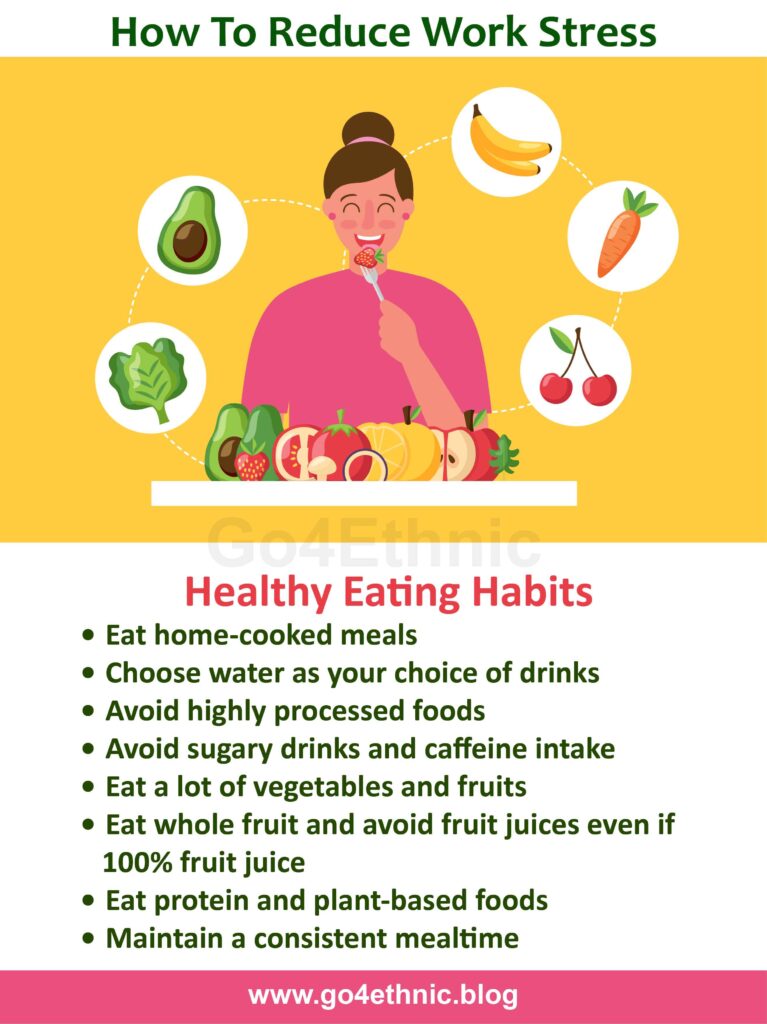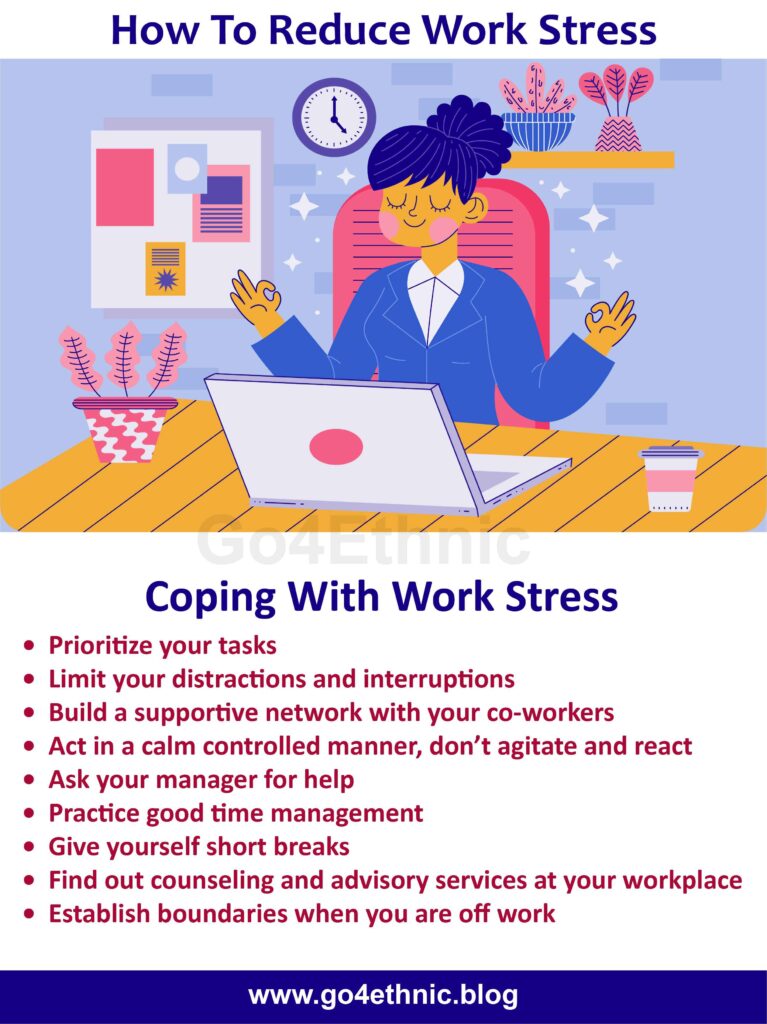Table of Contents
- The impact of work stress on your well-being
- Recognizing the signs and symptoms of work stress
- Prioritizing self-care for stress management
- Utilizing stress management techniques
- Adopt healthy eating habits
- Effective time management techniques to deal with work stress
- Establishing work-life balance
- Setting realistic goals and expectations
- Building a supportive work environment
- Seeking professional help for work-related stress
- Taking control of work stress and improving overall well-being
Are the pressures of work taking a toll on your well-being? If so, you’re not alone. For many individuals, joining corporate/high-demand jobs has entailed a substantial personal cost: Stress. The word “work stress” has found a firm place in the modern lexicon as “fast food”. In today’s fast-paced and high-pressure work environment, stress has become a chronic problem. The good news is, there are effective ways to reduce work stress and improve your overall well-being.
In this article, I will share the most effective strategies that you can implement to find a healthy work-life balance and achieve greater emotional and physical well-being.
From establishing clear boundaries and setting realistic goals to adopting a healthy holistic lifestyle, practicing mindfulness, and incorporating regular exercise into your routine, these techniques will help you manage stress, boost productivity, and enhance your overall quality of life. Whether you’re an employee, manager, entrepreneur, or top management executive, these strategies can be applied to any work setting effectively.
It would be prudent if I say, don’t let work stress control your life. Take proactive steps to reduce stress and enhance your well-being. Implementing the techniques outlined in this article will not only help you feel better and enjoy your work more, but it can also have a positive impact on your personal life. Prioritize your well-being and discover a healthier and happier work-life balance today.
The impact of work stress on your well-being
Work-related stress can have a significant impact on your overall well-being. When the demands and pressures of the job exceed your ability to cope, it can lead to a variety of physical, emotional, and mental health issues. Chronic stress can contribute to the development of various health problems, including cardiovascular disease, obesity, diabetes, cancer, high blood pressure, headaches, digestive issues, and even mental health conditions such as anxiety and depression.
Let us run through some eye-opening statistics, shall we? From my research, I found an article published in September 2022, The World Health Organization (WHO) and the International Labour Organization (ILO) have called for effective measures to address growing mental health concerns in the working population. Another article published by WHO stated globally, that an estimated 12 billion working days are lost every year to depression and anxiety at a cost of US$ 1 trillion per year in lost productivity.
The detrimental effects of work stress can extend beyond the workplace, spilling over into an individual’s personal life and relationships. Employees who are constantly stressed may experience difficulty in maintaining a healthy work-life balance, leading to burnout, decreased productivity, and strained personal relationships. This can further exacerbate feelings of stress and negatively impact an individual’s overall quality of life.
Further, I found there is a ton of published research on studying work-related psychosocial stress and its effect on mental and physical illnesses, the underlying mechanisms and biological markers contributing to stress-related disease progression, and the various remedies and interventions that are suggestive of reducing work stress in different occupations and work environments. Since the topic is too huge to cover in this blog article, I will break this into specific sub-topics in my future posts. For now, let us focus on how we can reduce work stress.
Addressing work-related stress is not only crucial for your own health and happiness but also for the overall success and productivity of your organization.
Recognizing the signs and symptoms of work stress
Identifying the signs and symptoms of work stress is essential for taking appropriate action to address the issue. While the manifestation of stress can vary from individual to individual, some common indicators are your body’s way of telling you that you have crossed the safety line between healthy work pressure and harmful stress.
Physical signs of work stress may include fatigue, headaches, muscle tension, digestive problems, and changes in sleep patterns. Emotional and mental symptoms can include irritability, anxiety, difficulty concentrating, and a sense of overwhelm or burnout. Behavioral changes, such as increased absenteeism, decreased productivity, or a lack of motivation, are also indicators of work-related stress.
It’s important that you pay attention to these warning signs and not dismiss them as temporary or insignificant. Ignoring the early signs of stress can lead to more severe and long-lasting consequences, both for your health and the organization. By recognizing the signs of work stress, you can take proactive steps to address the chronic issue and prevent it from spiraling out of control. For more information, do read my article on symptoms of work stress.
Prioritizing self-care for stress management
One of the most effective ways to manage your work-related stress is for you to prioritize self-care. When you are under significant work pressure and demanding work environment, it can be easy to neglect your own well-being. However, engaging in self-care practices is crucial for maintaining your physical, emotional, and mental health.
You must try and maintain a disciplined routine. Incorporate regular exercise into your daily routine. Regular exercise is a powerful stress management tool. Physical activity can help release endorphins, improve mood, and reduce the physical symptoms of stress. Whether it’s a daily walk, a yoga session, or a high-intensity workout, finding an exercise routine that aligns with your preferences can make a significant difference in managing your work stress.
Equally important is the practice of mindfulness and relaxation techniques. Try engaging in activities such as meditation, deep breathing exercises, or simply taking regular breaks can help you gain a sense of control and calm amidst the chaos of work.
Quieting the mind through meditation and yoga has been scientifically proven to improve overall health, and memory and stimulate creativity. These practices promote better sleep, enhance focus and concentration, increase productivity, and a sense of well-being that provides a much-needed respite from the demands of the job.
Utilizing stress management techniques
In addition to the strategies mentioned earlier, there are various stress management techniques you can incorporate into your daily routine to mitigate the impact of your work-related stress.
One of the powerful and most effective techniques is to practice mindfulness and meditation. Take regular breaks in mindful breathing exercises or guided meditations that can help you regain your calm and mental focus thereby reducing the physiological symptoms of stress. Mindfulness practices will improve your cognitive function, enhance your decision-making abilities, and improve your emotional well-being. I have been practicing mindfulness and meditation since 2005. In my opinion, this is one of the most powerful methods for gaining mental clarity, enhancing concentration, and improving overall well-being. Additionally, you can also incorporate 10-15 mins of daily walk during your lunch hour.
Adopt healthy eating habits
Another important aspect often overlooked and neglected by working professionals is indulging in bad food habits. You are what you eat. The science behind food and good health is not complex. There is a plethora of evidence linking balanced healthy diet to longevity and a healthy life. Good nutrition is an important stress management tool. Eat your green veggies, they are packed with all the essential vitamins and minerals. Add high-fiber foods such as oats, lentils, beans, broccoli, cauliflower, apples, strawberries, bananas, and chia seeds to your diet. Incorporating high fiber in your diet is associated with a reduced risk of cardiovascular diseases. Avoid taking sugary and aerated drinks, rather make herbal tea or plain water your choice of drink. Say ‘NO’ to processed foods. Take nutrient-dense healthy snacks during the day, some examples include veggies with hummus, trail mix, baked tofu, home made granola, protein bars, quinoa salad, nuts and seeds – such as walnuts, cashew nuts, pistachios, pumpkin seeds, handful of almonds.
Several research studies have shown Western fast-food diets are associated with higher oxidative stress and inflammation levels. Higher oxidative stress and inflammation trigger the onset of chronic diseases. It is crucial to make healthy dietary changes and consider taking home-cooked, healthy nutrient-packed foods to have lower oxidative stress and lower inflammation levels that will protect you from long chronic illnesses.
Effective time management techniques to deal with work stress
Effective time management is a crucial aspect of stress management in the workplace. Time management skills is all about your ability to make every bit of your time effective by being focused and not digressing your energy on other matters or things or worrying about the past or future. It is a crucial method of planning and prioritizing your tasks.
Time management often requires a change in habitual behavior. You can achieve it by building awareness of your activities, charting a clear list of tasks to be accomplished, marking your priorities on the list, setting deadlines for each of those tasks, and rewarding success.
When you feel overwhelmed by the demands of your work, it can contribute to feelings of depression and anxiety. By implementing strategic time management techniques, you can regain a sense of control and improve your overall productivity.
One effective strategy is to prioritize tasks and create a clear plan for the day or week. By identifying the most important and time-sensitive tasks, you can focus your energy on the most critical responsibilities, reducing the likelihood of feeling scattered or overwhelmed. Utilizing tools such as to-do lists, diaries, calendars, productivity apps, or management tool kits, you can stay organized and on track. Also consider delegating tasks to your team members. Delegating tasks can aid in team building and help you relieve your stress.
TOP TIP: When you are delegating tasks to your colleagues, always have patience and faith in the people to whom you are delegating work. Responsibilities should not be delegated unless you confer the authority to discharge those responsibilities.
Another important time management technique is the implementation of time-management strategies, such as the Pomodoro method or the “eat the frog” approach. These techniques involve breaking down tasks into manageable chunks, taking regular breaks, and prioritizing the most challenging or unpleasant tasks first. By employing these strategies, you will be able to manage your time, reduce feelings of overwhelm, and improve your overall productivity.
TOP TIP: Always plan ahead and try to anticipate the activities/tasks you will need to take up and gauge the level of commitments you will need to make. Make sure as you plan your tasks ahead, you must consider time for reflecting and learning, time for any gaps, delays or dependencies, and lastly, build in time for yourself.
Establishing work-life balance
Maintaining a healthy work-life balance is crucial for managing work-related stress and preserving your overall well-being. When the boundaries between work and personal life become blurred, it can lead to a constant state of frustration, stress, and burnout.
Set clear boundaries and establish a consistent routine to help you create a sense of balance and control. This may involve setting specific work hours, having designated lunch breaks, avoiding the temptation to check emails or respond to work-related messages outside of designated work time, and prioritizing your family time, leisure activities, and hobbies. By creating a clear separation between work and personal life, you can prevent the constant intrusion of work-related stress into your personal time.
It is helpful to say “no” to things to free up yourself and focus on tasks that need more attention. Saying “yes” is a great thing, but it’s difficult to turn down opportunities and requests, hence sometimes setting boundaries helps. Overcommitting to tasks or taking on additional responsibilities can quickly lead to burnout. By being selective about the projects and tasks you can take on, you can ensure that you have the necessary time and all the resources to complete your work efficiently within the deadline, without getting stressed and exhausted.
Additionally, it’s essential to take regular breaks and vacations. Stepping away from the work environment, even for a short period, can help you recharge, gain a fresh perspective, and return to your desk with renewed energy and focus. Encouraging yourself to take time off/ small vacation breaks and disconnect from work can have a positive impact on your overall well-being and productivity.
Setting realistic goals and expectations
Establishing realistic goals and expectations is essential for managing work-related stress. When you set unrealistic or overly ambitious targets, it can lead to a constant sense of pressure and a feeling of never being able to meet the demands placed upon you.
By setting achievable goals and objectives, you can experience a greater sense of accomplishment and satisfaction in your work. This can involve breaking down larger projects into smaller, more manageable tasks and setting milestones along the way. It’s also important to consider the resources and time available and adjust goals and objectives accordingly.
Always keep a check on your progress. Regularly reviewing and adjusting your goals can help you adapt to changing circumstances. Collaborating with managers or colleagues to set mutually agreed-upon goals can also foster a sense of support and shared responsibility. This may help ease your burden to some extent.
Building a supportive work environment
Creating a supportive work environment is crucial for managing your work-related stress. When you feel valued, respected, and supported by your colleagues and managers, it can have a significant impact on your overall well-being and resilience to stress.
Try engaging in open communication and fostering a culture of trust and transparency with your work buddies, and express your concerns and seek support when needed. Avoid gossip, complaining, whining over office matters, and blame game at all costs. Always use ‘winning’ and polite language in all modes of communication, be it verbal, email, or telephonic.
In more than two decades of my corporate life, I can say from my work experience that managers/executive management should always be approachable, actively listen to their team members, and provide constructive feedback and guidance. This fosters a harmonious working environment.
Additionally, check your organization’s policies and programs on employee well-being such as flexible work arrangements, mental health counseling, office gym, professional development programs, or team-building activities.
TOP TIP: Communicate with others where you have time conflicts and don’t make commitments that you know you can’t meet.
Seeking professional help for work-related stress
In some cases, the level of work-related stress may require the assistance of a mental health professional. When the stress becomes overwhelming and begins to significantly impact your personal and professional life, seeking professional help can be a crucial step in managing the issue.
Consulting with a therapist, counselor, or occupational health specialist can provide you with the necessary tools and support to address the root causes of your work-related stress. These qualified professionals can help you identify your work stressors, develop coping strategies, improve your communication skills, and explore ways to create a healthier work-life balance for you.
In some instances, a mental health professional may also recommend medication or other interventions to help alleviate your symptoms of stress-related conditions, such as anxiety or depression. By seeking professional help, you can gain a better understanding of your stress triggers, develop effective coping mechanisms, and take proactive steps to improve your overall well-being.
Taking control of work stress and improving overall well-being



In conclusion, managing work-related stress and improving overall well-being is a multifaceted endeavor that requires a combination of strategies and a commitment to self-care. By recognizing your signs of stress, prioritizing self-care, establishing a healthy work-life balance, and implementing effective time management and goal-setting techniques, you can take control of your work-related stress and enhance your overall quality of life.
Creating a supportive work environment, utilizing stress management techniques, and seeking professional help when necessary are additional crucial steps in addressing the impact of your work stress. By taking a holistic approach to your well-being, you can not only improve your own mental and physical health but also contribute to the overall success and productivity of your organization.
Remember, managing work-related stress is an ongoing process, and it’s essential to be persevering and compassionate throughout your journey. By prioritizing well-being and taking proactive steps to address the challenges of the modern work environment, you can find a healthier and more fulfilling balance, ultimately achieving personal and professional growth satisfaction.
If you have any suggestions or would like to get interesting content in your mailbox, drop me a message at go4ethnic@gmail.com.
Also, if you find this article valuable, do share it with your family, friends, and work buddies. It may help them cope with work stress. And lastly, don’t forget to subscribe to my mailing list to get more valuable content in your mailbox.






Nice blog
Thank you Maheshwar. Please subscribe to our newsletter.